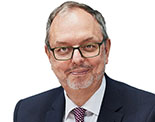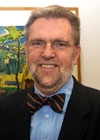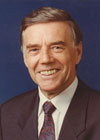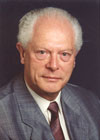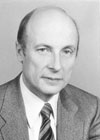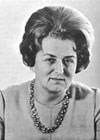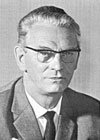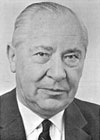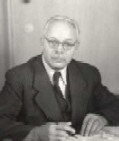Former Federal Returning Officers
2017 - 2022: Dr. Georg Thiel
Dr. Georg Thiel – President and Federal Returning Officer from 2017 to 2022
Dr. Thiel was born in Cologne in 1957. After completing his legal studies and obtaining his doctor’s degree in Cologne, he joined the Federal Civil Defence Agency in 1988 where he was promoted to Head of Section. From 1997 to 2002 he headed the Division “Organization and Information Technology” and various project groups at the Federal Ministry of the Interior. Then he was President of the Federal Agency for Technical Relief.
In 2006, Dr. Thiel returned to the Federal Ministry of the Interior, where he was Deputy Head of the Directorate-General “Administrative Modernization; Administrative Organization”. There he was responsible, among other things, for geoinformation, statistics, procurement and the single government service telephone number.
From October 2015 to October 2016, Dr. Thiel was deputy head of the Federal Office for Migration and Refugees. In October 2015, he was appointed Vice-President of the Federal Statistical Office and Deputy Federal Returning Officer. From January to November 2017, he has also been deputy of the Commissioner for Refugee Management.
From 1 November 2017 to 31 December 2022, Dr. Georg Thiel was President of the Federal Statistical Office and Federal Returning Officer. Under his management, the election to the 9th European Parliament from Germany and the election to the 20th German Bundestag were held.
Back to top2015 - 2017: Dieter Sarreither
Dieter Sarreither – President and Federal Returning Officer from 2015 to 2017
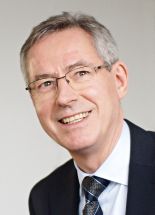
Dieter Sarreither was born in Frankenthal/Pfalz in 1951. After finishing his mathematics and economics studies in Heidelberg and Mainz, he started his professional career in operations research and system analysis in the private sector.
In 1982, he joined the Federal Statistical Office and became Assistant Head of Section in software development. His tasks then included the technological conception and software support of the functions of the Federal Returning Officer. Afterwards, he was Head of Section and Head of Division and was responsible for the development of strategies, standards and software tools for the information technology within the system of statistical offices. In 2000, he became Head of the Department on “Information Technology, Mathematical-Statistical Methods”. He launched manifold e-government initiatives which, under the heading of e-statistics, led to a comprehensive modernisation of statistical processes.
Dieter Sarreither was President of the Federal Statistical Office and Federal Returning Officer from 2 October 2015 to 31 October 2017.
Back to top2008 - 2015: Roderich Egeler
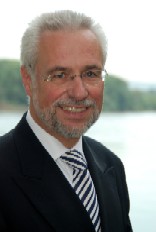
Roderich Egeler – President and Federal Returning Officer from 2008 to 2015
Roderich Egeler was born in Obernkirchen in Lower Saxony in 1950. After studying economics in Bonn and Cologne, he joined the Federal Office of Civil Defence in 1978. He held various positions in the Office, lastly as Head of Division, with his work focusing on disaster control and the budget. In 1991, Roderich Egeler moved to the Budget Division of the Federal Ministry of the Interior. He was appointed Head of the Procurement Agency of the Federal Ministry of the Interior in 1993.
From 1 August 2008 to 30 September 2015, Roderich Egeler was President of the Federal Statistical Office and Federal Returning Officer. Under his management, “double elections” were held in 2009, when Members of the European Parliament from Germany and the 17th German Bundestag were elected. Furthermore, he was in charge of the Bundestag election of 22 September 2013 and of the European Parliament election of 25 May 2014.
Back to top2006/2007 - 2008: Walter Radermacher
Walter Radermacher – President and Federal Returning Officer from 2006/2007 to 2008
Walter Radermacher was born in Walheim (near Aachen) on 10 June 1952. From 1970 to 1975 he studied business administration in Aachen and in Münster. After obtaining the academic degree of Diplom-Kaufmann (economist), he worked as member of academic staff at the University of Münster from 1975 to 1978.
At the beginning of 1978, Walter Radermacher joined the Federal Statistical Office. After working in various areas, he was Head of the Administration Department at the Federal Statistical Office from 2001 to mid-2003.
In June 2003 he was entrusted with performing the duties of vice-president on a trial basis, from 24 December 2003 with the function of vice-president. After Walter Radermacher had acted on behalf of the President from 6 October 2006, he was appointed President on 22 December 2006.
Right at the beginning of Walter Radermacher’s term of office as President of the Federal Statistical Office there was the time of the German Presidency of the EU Council. From 1 January to 30 June 2007 he was chairman of the Council Working Party on Statistics.
From 19 January 2007, Walter Radermacher was Federal Returning Officer. As of 1 August 2008, he was appointed Director General of Eurostat.
Back to top1992 - 1995: Hans Günther Merk
Hans Günther Merk – President and Federal Returning Officer from 1992 to 1995
Hans Günther Merk was born in Münchwald in the administrative district of Bad Kreuznach on 13 September 1930.
After obtaining his university entrance qualification in 1950, he studied law in Mainz. In 1954, he passed the first, and in 1958 the second state examination in law.
From 1958 to 1959, Hans Günther Merk worked as a lawyer and judge at the local court in Koblenz. In 1959, he joined the Federal Ministry of the Interior, where he served for 35 years in various functions, among other things, in the areas of sports and the media, data processing in public administration, and population issues. In the late 1960s, in the sports department of the Federal Ministry of the Interior, he was involved in the preparation of the 1972 Olympic Games in Munich.
Mr. Merk was entrusted with conducting the European election of 12 June 1994 (for the first time Union citizens were entitled to vote in the country in which they lived) and the Bundestag election of 16 October 1994.
Back to top1983 - 1992: Egon Hölder
Egon Hölder – President and Federal Returning Officer from 1983 to 1992
Egon Hölder was born in Pforzheim on 30 May 1927 and died on 2 September 2007. Following his military service and captivity (1944 to 1946), he obtained the university entrance qualification in Pforzheim in 1947. From 1948 to 1951 he studied law and social studies including technical subjects in Karlsruhe and Heidelberg. In 1951, he passed the first state examination in law and in 1955 the second state examination in law.
Following his second state examination in law, Egon Hölder joined the Federal Ministry of the Interior and was first engaged in constitutional matters. In 1958, he was seconded for a short time to the administrative district authorities of Mayen/Eifel and Neuwied/Rhine and in 1959 to the Federal Administrative Court in Berlin. In 1960, he returned to the Federal Ministry of the Interior. From 1963, he was Head of Section for issues of civil defence and emergency rescue, from 1967 Head of Section for organisational issues of the Federal Government and federal authorities. At the same time, he was responsible for the project group on “government and administrative reform”. In 1970, he was appointed Ministerialdirigent and head of a Sub-Directorate whose field of competence included especially issues of efficient application of data processing in public administration and data protection problems. From 1974 to 1983, he was head of the Sub-Directorate for federal cultural affairs and political education, also at the Federal Ministry of the Interior.
On 27 June 1983, Egon Hölder was appointed President of the Federal Statistical Office and fifth Federal Returning Officer. His term lasted until the beginning of June 1992.
Under his lead, Bundestag elections were conducted on 25 January 1987 (the former d’Hondt or highest average method was replaced by the Hare/Niemeyer method for distributing the seats, and Germans living abroad were entitled to vote for the first time) and 2 December 1990 (first all-German election), and European elections were held on 17 June 1984 and 18 June 1989.
Back to top1980 - 1983: Franz Kroppenstedt
Franz Kroppenstedt – President and Federal Returning Officer from 1980 to 1983
Franz Kroppenstedt was born in Marburg in 1931.
He also studied law there. Before being appointed President of the Federal Statistical Office, Franz Kroppenstedt worked at the Federal Administrative Court and at the local authorities of the town of Eschwege. In 1962, he joined the Federal Ministry of the Interior.
Mr. Kroppenstedt’s term as President of the Federal Statistical Office and Federal Returning Officer lasted about three and a half years (appointment on 1 January 1980).
Under his lead, elections were held to the 9th and 10th German Bundestag (5 October 1980 and 6 March 1983).
Back to top1972 - 1980: Dr. Hildegard Bartels
Dr. Hildegard Bartels – President and Federal Returning Officer from 1972 to 1980
Dr. Hildegard Bartels was born in Duisburg on 23 December 1914 and died on 16 September 2008.
After obtaining her university entrance qualification, Hildegard Bartels studied in Marburg, Leipzig, Cologne and Berlin from 1934 to 1944, first mathematics and natural science and then economics; in November 1944 she obtained a doctor’s degree (Dr. rer. pol.) in Berlin. After briefly working for the Reich Ministry of Economics, she started her career in official statistics by joining the Hessian Land Statistical Office in 1946, which had just been set up. Under difficult conditions, she conducted the first housing census in the new Land of Hessen, which had been created by the Allied Powers. Like Dr. Dr. h.c. Gerhard Fürst, she was one of those designing the Statistical Law for the United Economic Territory, which was the basis for setting up a central Statistical Office for the three zones.
In the new Office, Dr. Bartels worked in the Department of “General Subject-Related Co-ordination, National Accounts” from April 1948. In 1949, she was appointed Head of that Department and in 1967 Vice-President. In 1972, she became President of the Federal Statistical Office and Federal Returning Officer (1 May 1972). The economist was the first woman to be head of a federal authority in the Federal Republic of Germany.
Under her lead, Bundestag elections were held on 19 November 1972 (voting age lowered from 21 to 18 years) and on 3 October 1976 (age of eligibility reduced to 18 years), and the first election to the European Parliament was conducted on 10 June 1979.
Back to top1964 - 1972: Patrick Schmidt
Patrick Schmidt – President and Federal Returning Officer from 1964 to 1972
Patrick Schmidt was born in Fécamp/France on 4 February 1907 and died on 25 July 1974.
After obtaining his university entrance qualification in Berlin, Patrick Schmidt first achieved a specialised qualification at the Technical University of Berlin. He graduated as economist from the Commercial University of Berlin. From 1946, he was temporary Head of the Land Statistical Office of Bremen. In 1950, he joined the Federal Statistical Office before beginning to work for the Federal Ministry of Transport in 1957. In late 1964, Patrick Schmidt returned to the Federal Statistical Office as its President and Federal Returning Officer (day of appointment: 8 December 1964) and was responsible for preparing and conducting two Bundestag elections (19 September 1965 and 28 September 1969).
Back to top1948/1953 - 1964: Dr. Dr. h. c. Gerhard Fürst
Dr. Dr. h. c. Gerhard Fürst – Präsident und Bundeswahlleiter von 1948/1953 bis 1964
Dr. Dr. Gerhard Fürst, the first President of the Federal Statistical Office, was born in Berlin on 1 May 1897 and died in Wiesbaden on 27 July 1988.
In 1914, Gerhard Fürst obtained the university entrance qualification under war conditions. Following military service and captivity from 1914 to 1920, he studied political science and economics in Berlin and in 1923 he obtained a doctor’s degree (Dr. rer. pol).
In 1923, Dr. Dr. Gerhard Fürst joined the Reich Statistical Office in Berlin as a member of academic staff. First he was engaged in wage statistics, then in the preparation and evaluation of the census of population and occupation. In 1930, Dr. Dr. Fürst went to the League of Nations in Geneva where, until 1939, he was responsible for publications as Secretary of the Statistical Experts Committee. After a short period at the Consulate General in Geneva he returned to Berlin in 1940. At IG-Farben Industrie company, Dr. Dr. Gerhard Fürst became acquainted with the user side of statistics. From 1940 to 1945, he was a market observer in the national accounting department of IG Farben Industrie. In 1945, Dr. Dr. Fürst was assigned the task of setting up the Hessian Land Statistical Office and he became its first head of office.
In 1948, the Statistical Office of the United Economic Territory was established, and Dr. Dr. Gerhard Fürst was appointed head of office. In 1949, the Office of the United Economic Territory was renamed Federal Statistical Office, and Dr. Dr. Fürst became its President.
Dr. Dr. h.c. Gerhard Fürst was appointed the first ever Federal Returning Officer on 15 July 1953. In the “Electoral Act regarding the second Bundestag and the Federal Convention” of 8 July 1953, the Federal Returning Officer was defined as an electoral body for the first time. His/her functions were extended and made more specific in the “Federal Electoral Act” of 1956, a process which continues until today with amendments of that Act.
Under the lead of Dr. Dr. Gerhard Fürst, the three Bundestag elections of 6 September 1953, 15 September 1957 (expansion of the electoral territory to include the Saarland, and participation by postal vote being possible for the first time) and 17 September 1961 (initial use of voting machines) were held.
Back to top1949: Christian Stock
Returning Officer of the first election to the German Bundestag on 14 August 1949
At the first parliamentary election held in the Federal Republic of Germany after the Second World War, the “Electoral Act regarding the first Bundestag and the first Federal Convention of the Federal Republic of Germany” of 15 June 1949 provided for constituency and Land returning officers, but not for the function of federal returning officer. As a matter of fact, the Electoral Act drafted by the Parliamentary Council in the first half of 1949 had included that function, but the Act was modified by the Conference of Minister-Presidents so that the tasks performed by the federal retuning officer at later elections were shared.
The Land returning officers were responsible for holding the first election in the Federal Republic of Germany; the chairperson of the Conference of Minister-Presidents was entrusted with announcing the official election result.
A body of Land retuning officers was established, its chairperson being the Land returning officer of the Land whose Minister-President was in the chair of the Conference of Minister-Presidents at that time.
In the case of the first Bundestag Election of 1949, the Minister-President of Hessen, Christian Stock (SPD), was chairman. So he can be regarded as the Retuning Officer of the first election to the German Bundestag on 14 August 1949.
Back to top